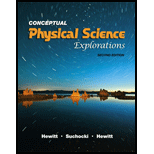
Concept explainers
To receive an electric shock, there must be
(a) current in one direction.
(b) moisture in an electrical device being used.
(c) high voltage and low body resistance.
(d) a difference in potential across part or all of your body.
The correct option for the statement “To receive an electric shock, there must be”.
Answer to Problem 4RAT
The correct option for the statement “To receive an electric shock, there must be” is option (d).
Explanation of Solution
The mobility of electrons in any part of the body in a straight line under the influence of electric voltage is known as electric current. The flow of electric current requires the potential between two extreme ends of the body.
Electric potential is the form of energy that moves the charge from a certain point in space to a distance depending upon its strength. The more the potential difference across the ends of the body, the more will be the electric current flows through it under the same conditions.
If a body has a low resistance and if there is no potential difference across it, then there will be no electric current flows through the body.
Conclusion:
Therefore, the correct option for the statement “To receive an electric shock, there must be” is option (d).
Chapter 10 Solutions
Conceptual Physical Science Explorations
Additional Science Textbook Solutions
University Physics Volume 1
Essential University Physics: Volume 1 (3rd Edition)
Essential University Physics (3rd Edition)
College Physics: A Strategic Approach (4th Edition)
Conceptual Physical Science (6th Edition)
Life in the Universe (4th Edition)
 College PhysicsPhysicsISBN:9781305952300Author:Raymond A. Serway, Chris VuillePublisher:Cengage Learning
College PhysicsPhysicsISBN:9781305952300Author:Raymond A. Serway, Chris VuillePublisher:Cengage Learning University Physics (14th Edition)PhysicsISBN:9780133969290Author:Hugh D. Young, Roger A. FreedmanPublisher:PEARSON
University Physics (14th Edition)PhysicsISBN:9780133969290Author:Hugh D. Young, Roger A. FreedmanPublisher:PEARSON Introduction To Quantum MechanicsPhysicsISBN:9781107189638Author:Griffiths, David J., Schroeter, Darrell F.Publisher:Cambridge University Press
Introduction To Quantum MechanicsPhysicsISBN:9781107189638Author:Griffiths, David J., Schroeter, Darrell F.Publisher:Cambridge University Press Physics for Scientists and EngineersPhysicsISBN:9781337553278Author:Raymond A. Serway, John W. JewettPublisher:Cengage Learning
Physics for Scientists and EngineersPhysicsISBN:9781337553278Author:Raymond A. Serway, John W. JewettPublisher:Cengage Learning Lecture- Tutorials for Introductory AstronomyPhysicsISBN:9780321820464Author:Edward E. Prather, Tim P. Slater, Jeff P. Adams, Gina BrissendenPublisher:Addison-Wesley
Lecture- Tutorials for Introductory AstronomyPhysicsISBN:9780321820464Author:Edward E. Prather, Tim P. Slater, Jeff P. Adams, Gina BrissendenPublisher:Addison-Wesley College Physics: A Strategic Approach (4th Editio...PhysicsISBN:9780134609034Author:Randall D. Knight (Professor Emeritus), Brian Jones, Stuart FieldPublisher:PEARSON
College Physics: A Strategic Approach (4th Editio...PhysicsISBN:9780134609034Author:Randall D. Knight (Professor Emeritus), Brian Jones, Stuart FieldPublisher:PEARSON





